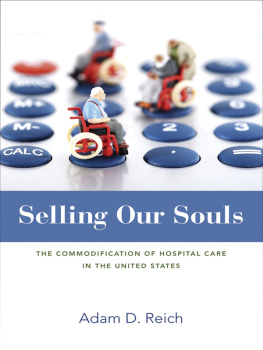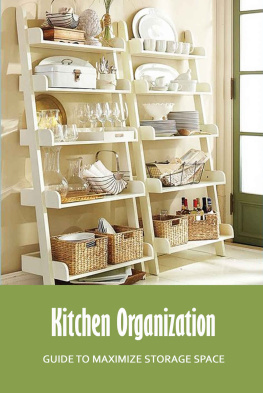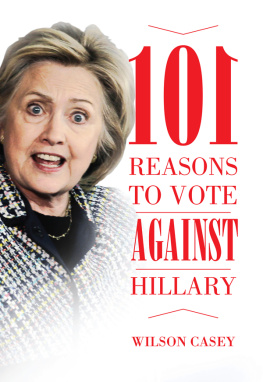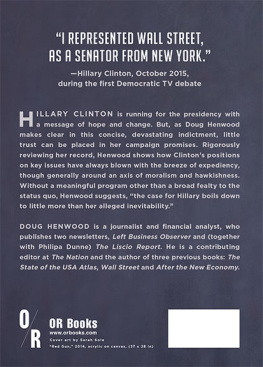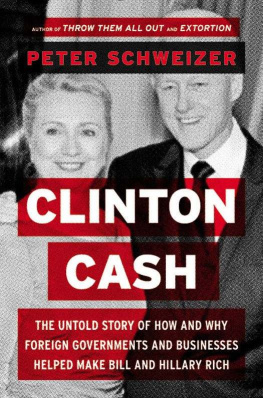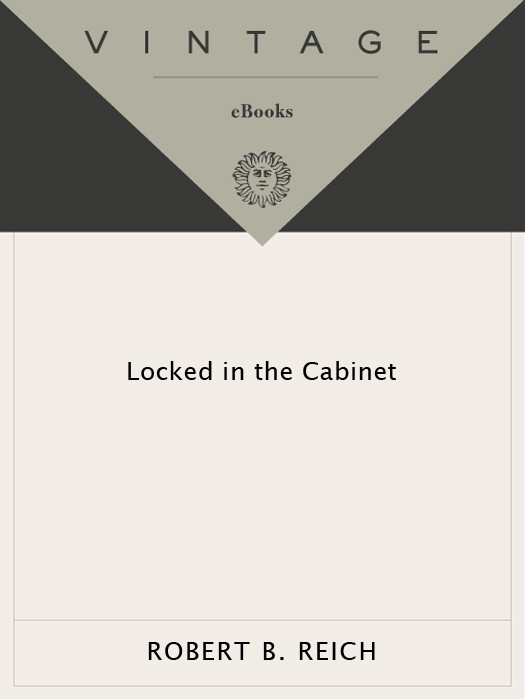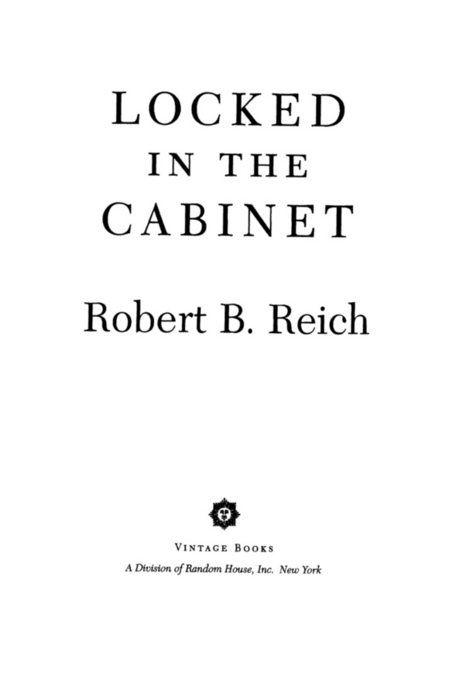CRITICAL ACCLAIM FOR
LOCKED
IN THE CABINET
Mr. Reich is principled, caring, fascinated with ideas. You dont have to share [his] policy prescriptions to appreciate the wisdom of his analysis riveting.
Wall Street Journal
Funny and perceptive.
Washington Post
[Reich] is ruefully funny about Washington, even more so about himself.
The New York Times Book Review
Fast-paced, trenchant, entertaining, and angry a rich variety of observations and anecdotes hilarious.
Boston Globe
Locked in the Cabinet surpasses most recent tell-alls. It is better written and it considers serious intellectual questions. Reich is a good storyteller with an appreciation of Washingtons many absurditiesand he is willing to laugh at himself.
Business Week
A LSO BY R OBERT B. R EICH
The Work of Nations
The Resurgent Liberal
Tales of a New America
The Power of Public Ideas
(editor and co-author)
New Deals: The Chrysler Revival
and the American System
(with John D. Donahue)
The Next American Frontier
Minding Americas Business
(with Ira Magaziner)
R OBERT B. R EICH
LOCKED
IN THE CABINET
Robert B. Reich is University Professor and Maurice Hexter Professor of Social and Economic Policy at Brandeis Universitys Heller Graduate School He served as Secretary of Labor in the first Clinton administration. This is his seventh book. He lives in Cambridge, Massachusetts, with his wife and their two sons.
F IRST V INTAGE B OOKS E DITION , F EBRUARY 1998
Copyright 1997, 1998 by Robert B. Reich
All rights reserved under International and Pan-American Copyright Conventions. Published in the United States by Vintage Books, a division of Random House, Inc., New York, and simultaneously in Canada by Random House of Canada Limited, Toronto. Originally published in slightly different form in hardcover in the United States by Alfred A. Knopf, Inc., New York, in 1997.
Grateful acknowledgment is made to the following for permission to reprint previously published material: Alain Boublil Music Ltd.: Do You Hear the People Sing?, from the musical Les Misrables by Alain Boublil and Claude-Michel Schnberg, music by Claude-Michel Schnberg, lyrics by Alain Boublil, Herbert Kretzmer, and Jean-Marc Natel, copyright by Alain Boublil Music Ltd. (ASCAP). Reprinted by permission of Alain Boublil Music Ltd., administered by Stephen Tenenbaum & Company, Inc. Warner Bros. Publications U.S. Inc.: Excerpt from Respect by Otis Redding, copyright 1965 by East/Memphis Music and Time Music Co., Inc., copyright renewed, assigned to Irving Music, Inc. (BMI) in USA. Rights outside USA administered by Warner-Tamerlane Publishing Corp. All rights reserved. Reprinted by permission of Warner Bros. Publications U.S. Inc., Miami, FL 33014.
Library of Congress Cataloging-in-Publication Data
Reich, Robert B.
Locked in the cabinet / Robert B. Reich.
p. cm.
Originally published: New York : Knopf, 1997.
eISBN: 978-0-307-83056-2
1. Reich, Robert B. 2. Cabinet officersUnited StatesBiography.
3. United States. Dept. of LaborBiography. I. Title.
[E840.8.R445A3 1998]
973.929dc21 97-35525
Random House Web address: www.randomhouse.com
v3.1
To my family
Contents
Tis in my memory lockd,
And you yourself shall keep the key of it.
Hamlet, ACT 1, SC . 3
N OTE TO THE R EADER
The following is the story of one mans journey during four years as a member of the cabinet, striving to serve his country, his president, and his convictions, and, with a fair measure of audacity, seeking to do all three simultaneously.
Being Secretary of Labor was the best job I have ever had and probably ever will. For many years before, I had researched and written about investing in our nations most precious resourceits human capitaland about reversing the long-term slide toward widening inequality of income, wealth, and opportunity. Now I had a chance to implement my ideas under a president who shared them. The job was variously startling, hilarious, exhausting, frustrating, and rewarding. When I especially wanted to remember what occurred I jotted notes to myself, usually late at night.
The decision to leave the cabinet, which I made several weeks before the 1996 presidential election, was painful, because it meant giving up this part of my lifes work. But my children were becoming young teenagers who would be home only a few more years, and I couldnt bear the thought of forfeiting this precious time with them. After the election I began to review and consolidate my notes, mainly as a means of helping myself come to terms with the departure, and of understanding what had been accomplished and what left unfinished. Herewith, the result.
If any of those with whom I rubbed shoulders, and who are described in the following pages, feel ill-served by my account, I can only offer my apologies. I claim no higher truth than my own perceptions. This is how I lived it. This is what I learned.
INTRODUCTION
TO THE V INTAGE E DITION
Its getting on a year since I left the cabinet. Mostly Ive spent the time reintroducing myself to my family. Some who leave cabinet posts suffer painful decompression, not unlike deep-sea divers who come back to the surface too quickly. My ascent to fresh air has been relatively pain-free. The only symptom Ive noticed is a slight disorientation stemming from having to do normal things for myself rather than rely on aides. Call it staff deprivation. Driving myself through rush-hour traffic, getting lost in an underground garage, standing for an hour in line to buy airline tickets, endlessly exchanging voicemails: the simple irritations of private life were denied me for the four years I devoted to the grand irritations of public life.
There is also, I confess, a certain frustration in no longer being in the loop, nor even near it. At this writing, the American economy continues to be strong. Unemployment is down, as is inflation. Growth and productivity are up. Corporate profits and the stock market are soaring. (There are signs that the market may be settling down, however.) America is preeminent in the world, without enemy or rival. If ever there was a time to get on with the unfinished agenda of creating real opportunity for all of our citizens, it is now. And yet that agenda is still very much unfinished: Adjusted for inflation, half of all workers are still earning less than they did in 1989. And despite modest gains among the working poor, the 1990s have witnessed greater polarization of income than at any other time since the Second World War. We are fast becoming two culturesone of affluence and contentment, the other of insecurity and cynicism.
The nation is strangely immobilized. Rather than giving us the confidence we need to move forward, the good news seems rather to have anesthetized us. A future generation looking back on this era may wonder whywhen we had no hot or cold war to fight, no depression or recession to cope with, no great drain on our resources or our spiritswe did so little. Little, that is, relative to what the situation demanded; little, relative to what we could have done. Did we simply assume that the economic expansion would last forever? That the sharp disparities of income, wealth, and opportunity would not have serious consequences, or that they would automatically shrink? That we would never again face common threats of the sort which draw upon the reservoirs of trust and solidarity which we allowed to run dry?



